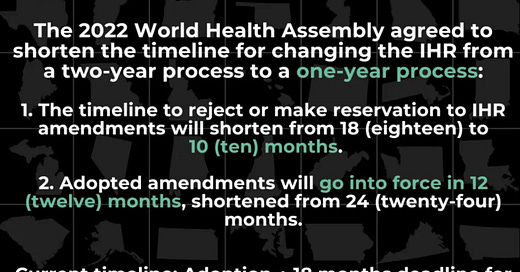Slow Down the Great Reset by rejecting WHO's IHR amendments, passed using a loose consensus procedure 16 months ago
In January 2022 the USA put forward a dozen new amendments to be considered by the 194 members of the WHO at its annual meeting in May 2022. These proposals essentially would have given the WHO more centralized power and speed up the adoption of new treaties and amendments to existing International Health Regulations. While the EU nations and other US allies came forward to support them, there was considerable pushback and most of the amendmentswere withdrawn and not put to a vote in 2022. But some remained, and were adopted without a vote after back room negotiations.
These amendments to the existing International Health Regulations reduced the time for new amendments to go into effect from 24 months to 12 months. The initial proposal was to reduce the time period during which nations could issue a formal opt-out to new amendments from 18 to 6 months. That did not fly, so a compromise was reached, giving nations 10 months to reject future amendments before being bound by them. Any amendments adopted next May will come into force 12 months later and will have a 10 month period during which nations can opt out.
However, the amendments passed last year to do this are still subject to the old rules, giving nations 18 months to opt out of them. Those 18 months will be up December 1, 2023.
Nations that opt out of the May 2022 amendments by December 1 will not be bound by future amendments until 24 months after adoption, and will have 18 months to reject future amendments.
Is this complicated or what?
The Great Reset planners are trying to move forward with their CBDCs, Digital IDs, 15 minute “smart” cities, pandemic treaty (currently being referred to as an “accord”) and the IHR amendments, and many other schemes over the next few months. In the current proposed version of the treaty (the Bureau draft) the WHO Bureau has shortened the time for the treaty to go into effect to only 30 days after the 30th signatory nation signs on—which could be next July, or about 9 months from now! But with so many egregious and unpopular proposals in it, expect the WHO managers to make major changes in the next proposed version, due out late in October.
Any opportunity we have to throw a wrench in the works will be good! The eleven nations that formally rejected the UN’s proposals last week are those most likely to reject the IHR amendments at the WHO.
If you have any useful connections with officialls or influentials with any of these nations, please consider contacting them about this!
See James Roguski’s substack. Feel free to contact me if you want to help with this at merylnass@gmail.com. Those nations are:
Belarus
Bolivia
Cuba
Democratic People’s Republic of Korea
Eritrea
Islamic Republic of Iran
Nicaragua
Russian Federation
Syrian Arab Republic
Venezuela
Zimbabwe
Thanks for helping out. Reread this once or twice more as it is very confusing!





We need a Great Reject!
It is getting so that if you want to hide money from an elected officials the best place to put it is in a copy of the Constitution- because it is very unlikely they will ever read it. The tragedy is that the US is leading this "Reset".
That is a very interesting list of countries. Mostly hard core communist. What’s up with that? What do they know we do not?